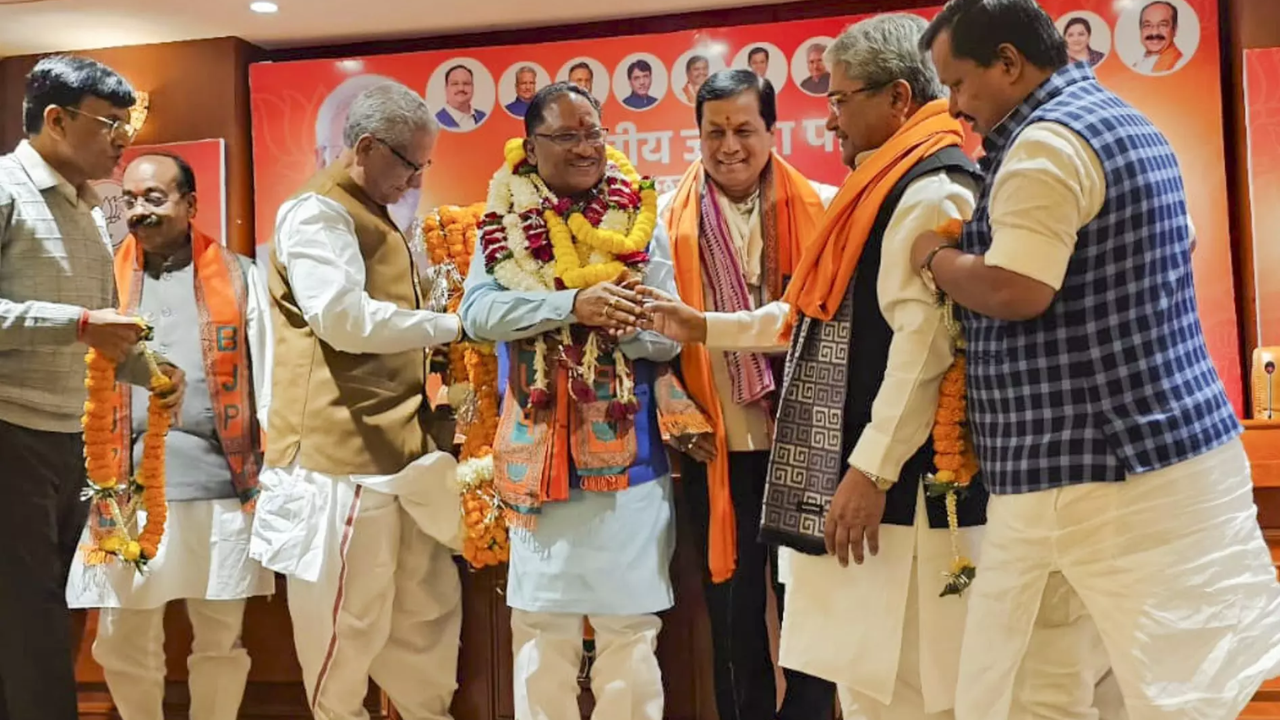RAIPUR: Tribal leader Vishnu Deo Sai‘s journey to the Chhattisgarh chief ministership follows the trajectory of grassroots leaders – interning on the political shop floor and going through the grind at the panchayat level before rising up the ranks to earn his stripes on the big stage.
Sai’s gentle demeanour, ability to steer clear of controversy, organisational skills and connection with his tribal roots are the other attributes that helped BJP make the decision to pick him for the state’s highest office.
The 59-year-old MLA from Kunkuri (ST) constituency in North Chhattisgarh is the second tribal leader of the state after Ajit Jogi, who became the state’s first CM in November 2000, to go that far.
Known to be close to BJP vice-president and three-time CM Raman Singh, the soft-spoken Sai has always chosen to be aloof from the spotlight, both within the party and outside. But with the state’s electorate consistently rejecting the aggressive brand of politics practised by most, it was just a matter of time before his party would catapult him to the hot seat.
BJP’s massive victory, winning 18 ST seats and sweeping all 14 in the Surguja region, played a role in Sai becoming the chief minister of a state where the tribal population accounts for more than 32% of voters.
Starting his political career in 1989 as a member of the Bagiya village panchayat, a tribal village of Bandarchua in the Kansabel block in undivided Madhya Pradesh, Sai was later elected unopposed as the sarpanch of the same village in 1990.
He was elected to the assembly from Tapkara constituency of then Madhya Pradesh in 1990, a seat he held till 1998.
The following year, he was elected to the 13th Lok Sabha from Raigarh (ST) constituency. After the formation of Chhattisgarh, he became the state president of BJP in 2006 and was later elected to the Lok Sabha twice in 2009 and 2014 from Raigarh.
In the first Narendra Modi government at the Centre, Sai was minister of state for steel, mines, labour, and employment from 2014 to 2019. After BJP’s defeat in the 2018 elections, the leadership replaced then-state party chief Dharamlal Kaushik, an OBC, with Sai, who continued in that post until August 2022.
The tribal leader was replaced as state party chief when the BJP leadership apparently felt the need to counter Congress CM Bhupesh Baghel’s aggressive OBC narrative. MP Arun Sao, who is from the OBC Sahu community, was named the new state party chief.
Sai quietly retreated to his native village but continued to work for the organisation as a member of BJP’s national working committee. Few, if any, could have imagined then that he would become CM someday.
Sai’s gentle demeanour, ability to steer clear of controversy, organisational skills and connection with his tribal roots are the other attributes that helped BJP make the decision to pick him for the state’s highest office.
The 59-year-old MLA from Kunkuri (ST) constituency in North Chhattisgarh is the second tribal leader of the state after Ajit Jogi, who became the state’s first CM in November 2000, to go that far.
Known to be close to BJP vice-president and three-time CM Raman Singh, the soft-spoken Sai has always chosen to be aloof from the spotlight, both within the party and outside. But with the state’s electorate consistently rejecting the aggressive brand of politics practised by most, it was just a matter of time before his party would catapult him to the hot seat.
BJP’s massive victory, winning 18 ST seats and sweeping all 14 in the Surguja region, played a role in Sai becoming the chief minister of a state where the tribal population accounts for more than 32% of voters.
Starting his political career in 1989 as a member of the Bagiya village panchayat, a tribal village of Bandarchua in the Kansabel block in undivided Madhya Pradesh, Sai was later elected unopposed as the sarpanch of the same village in 1990.
He was elected to the assembly from Tapkara constituency of then Madhya Pradesh in 1990, a seat he held till 1998.
The following year, he was elected to the 13th Lok Sabha from Raigarh (ST) constituency. After the formation of Chhattisgarh, he became the state president of BJP in 2006 and was later elected to the Lok Sabha twice in 2009 and 2014 from Raigarh.
In the first Narendra Modi government at the Centre, Sai was minister of state for steel, mines, labour, and employment from 2014 to 2019. After BJP’s defeat in the 2018 elections, the leadership replaced then-state party chief Dharamlal Kaushik, an OBC, with Sai, who continued in that post until August 2022.
The tribal leader was replaced as state party chief when the BJP leadership apparently felt the need to counter Congress CM Bhupesh Baghel’s aggressive OBC narrative. MP Arun Sao, who is from the OBC Sahu community, was named the new state party chief.
Sai quietly retreated to his native village but continued to work for the organisation as a member of BJP’s national working committee. Few, if any, could have imagined then that he would become CM someday.
